Troy woman struck by breast cancer finds surrogacy as a path to motherhood
Sveta Prakash Desai was the child who spent time at the neighbor's house after a baby was born, caring for the infant while the new mom made dinner, washed dishes or folded laundry.
She was the teenager who loved to babysit and worked as a nanny in the summer. When her siblings had children, she doted on her nieces and nephews, always dreaming that one day, she'd have a baby of her own.
Desai, who lives in Troy and works in procurement for British-based beer and spirits maker Diageo, realized as she got older and still hadn't found a partner that time was running out. At age 35, she had five eggs retrieved and cryogenically stored to preserve the possibility of having children.
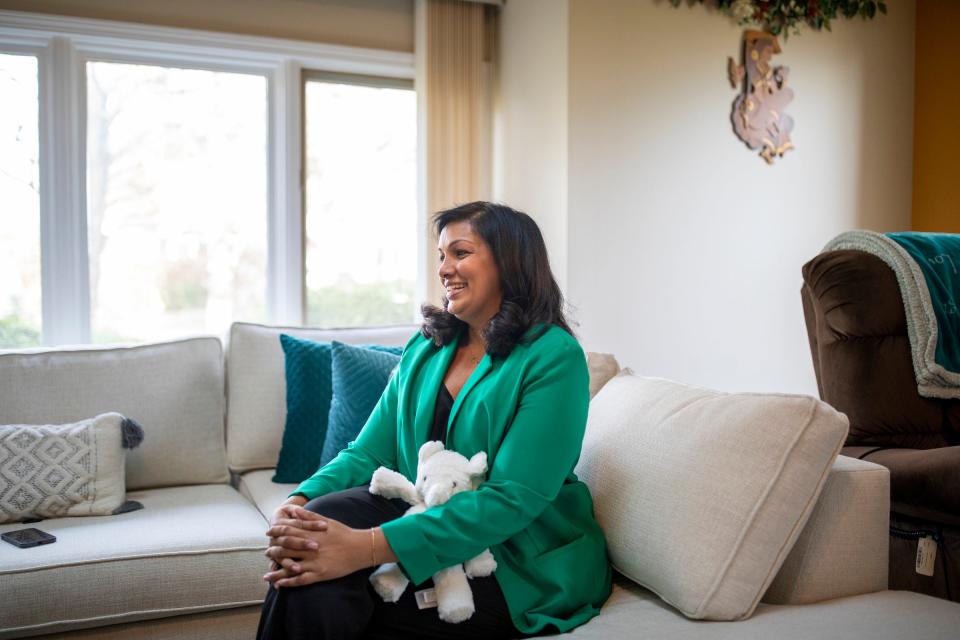
"It was always my backup plan," said Desai, who is now 40. "My doctor even said, ‘Look, five is not great, but ... you should still conceive naturally. Nothing in your numbers says that you can't.’
"That was 2018."
Breast cancer made pregnancy risky
A year and a half later came the stage 3 breast cancer diagnosis that changed everything, leading Desai down a path to parenthood she never imagined: Surrogacy.
Surrogacy contracts have been illegal in Michigan since 1988, when it became the first state to ban such arrangements. So Desai is traveling to Texas, where her baby is being carried by a 37-year-old Dallas woman who is due in early March.
Though she was scared when she learned she had cancer, "I took death off the table early on," Desai said. "I didn't know if I was gonna make it, but ... how do you fight something if you think the end is near? That's when I kind of focused my attention on my fertility. I spent a lot of time asking questions about that."
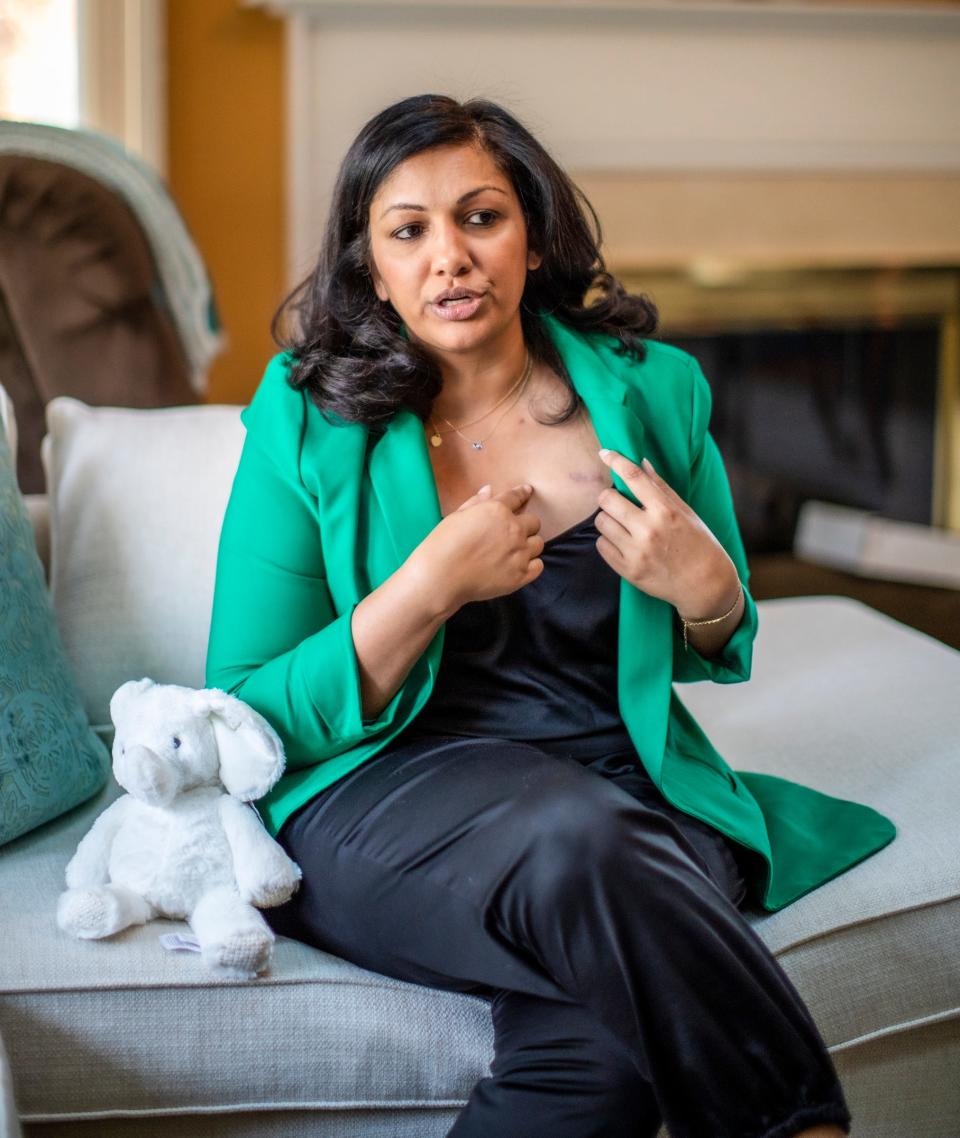
Because the growth of her cancer cells was driven by the hormones progesterone and estrogen, her oncologist told her it would be too risky to carry a pregnancy for at least five years after her treatment began.
"So at that point, early in my diagnosis, I knew that (age) 42 ... would be the earliest I could carry a pregnancy, and I already started to feel like that was too late," Desai said.
"I want my mom to be a part of my life and the life of my child. ... I already lost a parent, so I was like, 'I'm not going to wait five years.' "
In 2021, she began researching surrogacy agencies.
"I didn't feel super confident in five eggs only, but I felt like I at least had something. My cancer was too aggressive for my doctors to really pause and say, ‘Yeah, go do an egg retrieval.'
"I knew I had to be open to things, ... that I was likely going to fertilize those five eggs with donor sperm. And if I couldn't carry, I was going to have surrogacy."
The plight of younger women with breast cancer
Desai is among a growing number of younger women who hear the words "you have breast cancer" in the U.S. The incidence rate of breast cancer among women younger than 50 rose about 7.7% from 2010-19, to 23.7 per 100,000 people, according to a study published in August in JAMA Open Network.
Annual mammography screening doesn't typically begin until age 40 for women at average risk of breast cancer, under new draft guidelines from the U.S. Preventive Services Task Force.
For Desai and the swell of younger women who are increasingly being diagnosed with later stages of aggressive disease, beginning breast cancer screening at age 40 comes too late.
"I was too young for a mammogram," Desai said. "I was only 36 at the time of diagnosis. Honestly, I had this really weird feeling in my breast. It kind of felt like an infection. I was in Portugal, traveling, and something just didn't feel right."
When she got home, she saw her general practitioner, who quickly ordered scans and a biopsy.
"So that's when we kind of knew that I was going down that path."
'What can I do to preserve my fertility?'
When cancer strikes during childbearing years, preserving fertility must be part of the treatment conversation, said Dr. Mohammad Chisti, an oncologist and hematologist for Corewell Health East.
"It is always challenging, especially when women like Sveta are looking forward to their life, living their life to the fullest and all of a sudden, there is an unfortunate diagnosis that changes their life altogether," he said. "It’s kind of like getting hit by a truck or having a major accident when you give them the diagnosis.
"I remember Sveta said, 'I'm unmarried. I have always concentrated on my career because I thought I can do this later on, but I want to be a mother. What can I do to preserve my fertility? How can I still accomplish the dream of being a mom?' "
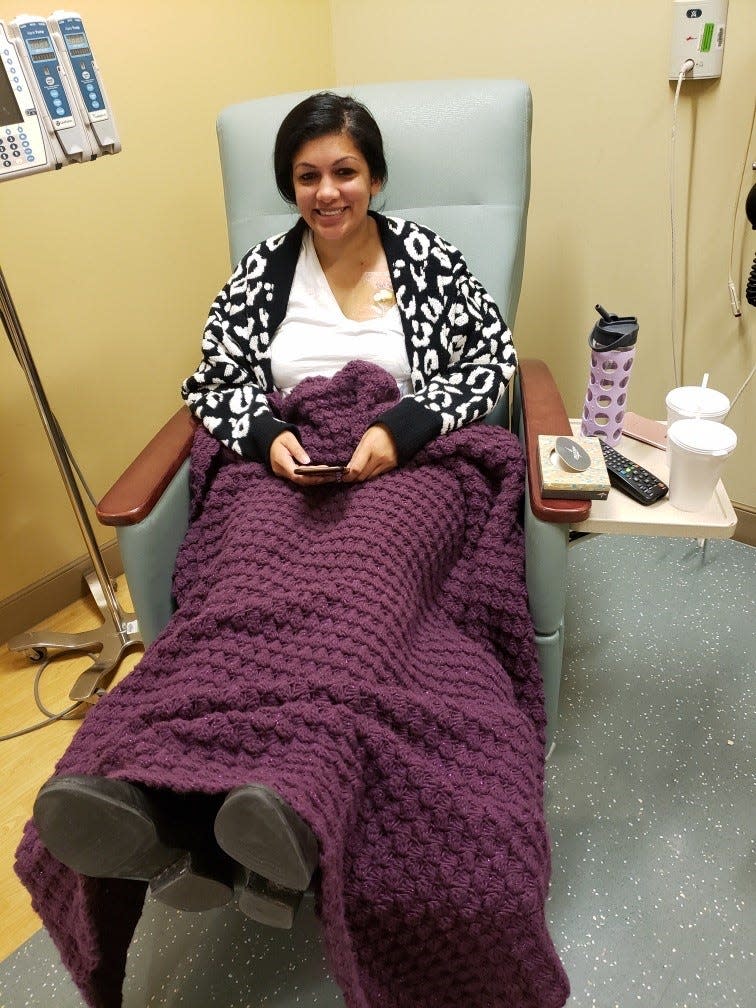
Desai's cancer was an aggressive invasive ductal carcinoma, Chisti said. "It had already gone to the local lymph nodes and there was some skin involvement."
The first line of treatment for her was chemotherapy, which was followed by surgery and radiation, Chisti said.
"It depends on the type of regimen we use, but there is between a 10% and 30% chance that fertility could be affected" by chemotherapy, he said. Because women have a limited reserve of eggs stored in their ovaries, protecting them during treatment with injections of hormones ... can help.
"There are some trials that show the chance of infertility could be reduced by more than half," Chisti said, when hormone injections are used to blunt the effects of chemo. Retrieving eggs or an entire ovary and storing that tissue in a cryogenic facility is another option for women undergoing cancer treatment.
Although preserving Desai's fertility was top of mind, saving her life had to come first.
The painful course of treatment
Treatment began in November 2019.
"We used a very standard, guideline-based chemotherapy, which uses three drugs," Chisti said. "One is Adriamycin, which has effects not only on fertility but also the heart; and Cytoxan, which is a bone-marrow suppressant as well. And, then the Taxol, which causes neuro problems and neuropathy and also has an impact on the ovaries and fertility. Those were the agents that she was given over five months."
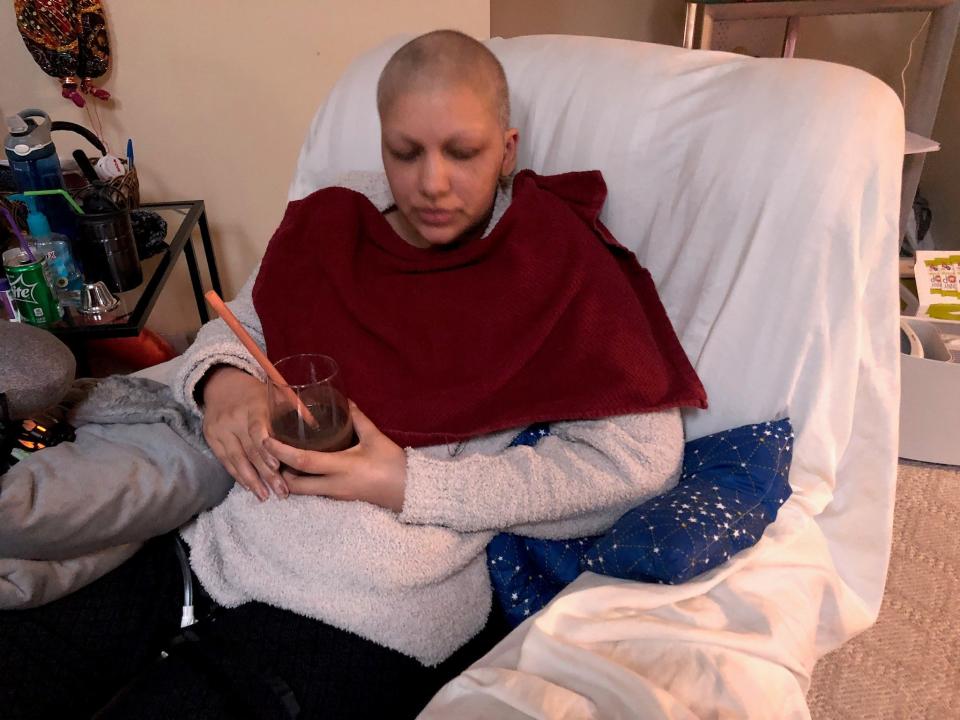
Desai held her hands near her waist to show how long her raven hair had been before chemotherapy. "What the chemo does is it attacks all the live cells, which is why you lose all your hair," she said. "It is painful — like it is nerve-ending painful. I couldn't touch my head. ... So then we just shaved it. ... It sucks because it's just another thing you're losing, but looking back on it, I feel like my hair was like the least of my concerns."
After eight weeks of Adriamycin-Cytoxan treatments, Desai started on weekly Taxol infusions, which made her fingernails and toenails fall out.
"Then I had a break and then I went into bilateral mastectomy," she said. "I also removed 13 lymph nodes on the right because the cancer had already moved to the lymph nodes and then I removed three lymph nodes on the left."
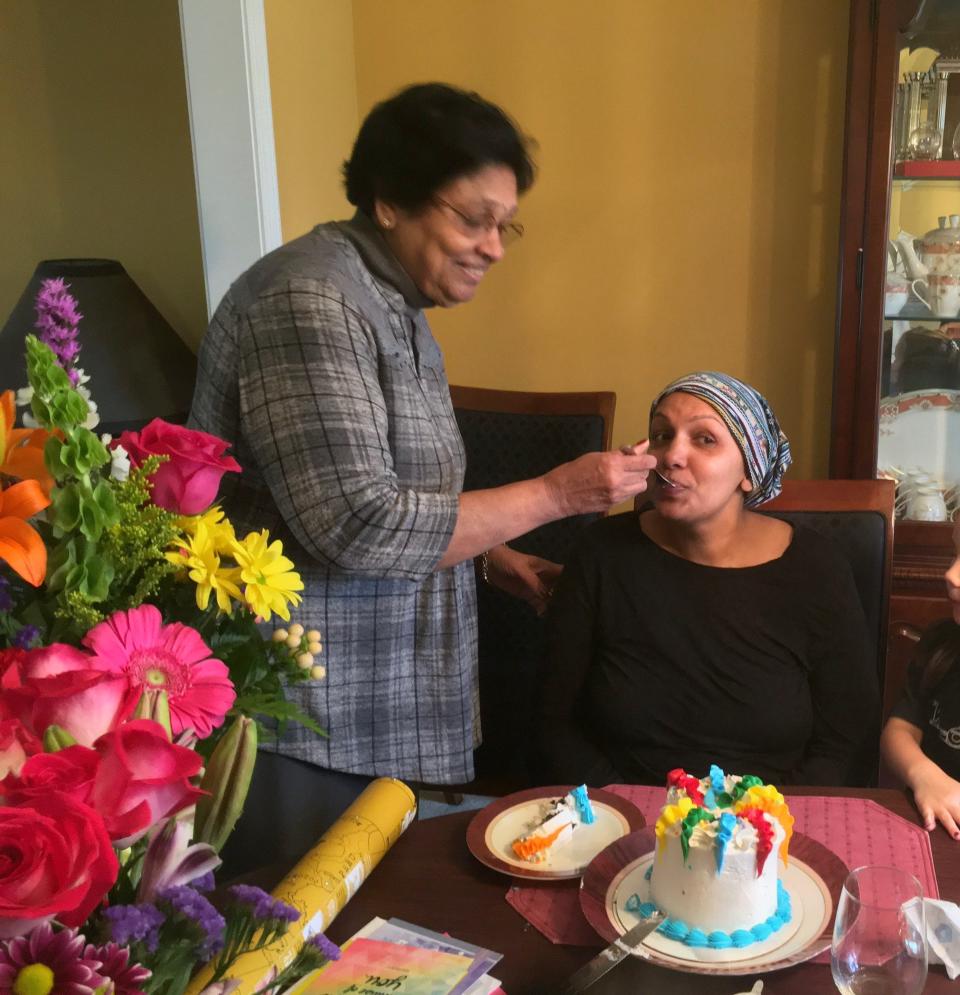
Tissue expanders were placed to prepare her body for breast reconstruction and in the summer of 2020, she underwent radiation treatments every day for 33 consecutive days.
"Because I had inflammatory breast cancer, they wanted to see a skin response," Desai said. "So I was very burned."
After the treatments
By the spring of 2021, Desai was finally finished with active cancer treatment and had reconstructive surgery, but the aftereffects of the disease weren't done with her.
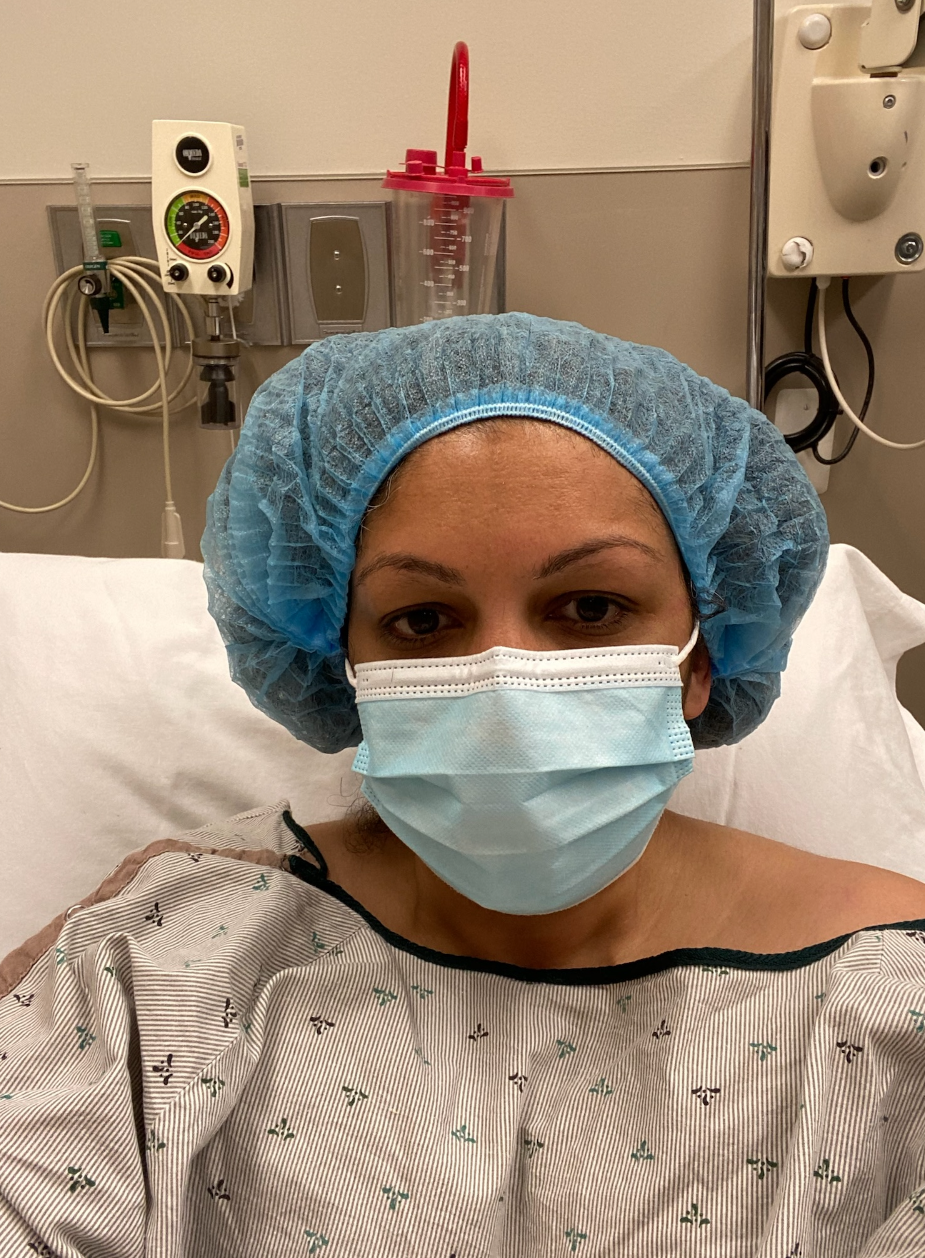
Years later, Desai continues to have painful swelling called lymphedema in her right arm that may never go away, despite compression, wrapping it in bandages and having twice-weekly physical therapy. She'll have a surgery in January to try to improve the drainage in her arm.
She still has no feeling on the right side of her chest. She takes an oral chemotherapy drug, Chisti said, which she'll continue for 10 years, in addition to an injectable drug that suppresses her ovaries to prevent the production of estrogen. Desai will have to take that until she reaches menopause.
And if she tries to carry her own pregnancy, she said she's worried it could trigger a reoccurrence of cancer.
That's why she doesn't call herself a cancer survivor.
"Survivor means you've survived, so you're done, right?" Desai said. "Whereas thriving means this is not a diagnosis that ends. ... Thriver gives more respect to women. It implies that it's not over, but you're thriving. You're trying to do the best you can with what's around you and what you have in front of you."
Whether what's in front of you is infertility, the fear of recurrence, other health effects, such as neuropathy, or trying to navigate dating after cancer treatment.
'My whole fertility was gone'
On a sunny mid-November day, Desai, sat on a bed in the second-floor guest room that will become a nursery. She cradled a plush white elephant in her arms. She smiled as she talked about the baby she'll have in March — finally, after all these years.
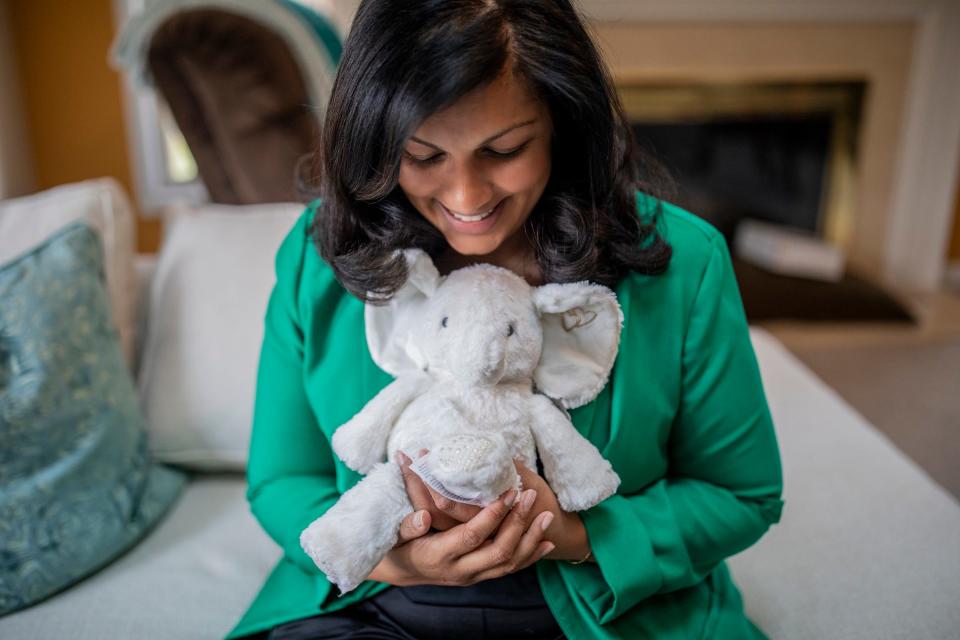
Although no fetus grows in her womb, Desai describes herself as pregnant. This baby is hers, even though her child was created in a lab with donor sperm and a donor egg when her own five oocytes didn't survive thawing from cryopreservation and a second attempt to retrieve her eggs failed.
"To lose all five within hours on a single day was like devastation. My whole fertility was gone," she said. "And then I did attempt to do one more retrieval in March of this year and didn't get anything."
Still, Desai had prepared for that possibility.
"I had to like disconnect from that and think: What is my purpose? I want to do this and I want to be a mom. And being the mom doesn't have to do with biology for me.
"There are times when I’m not happy about it and I'm angry, but I think mostly I'm focused on the fact that I'm having a child and that is what I wanted."
Finding the sperm and egg
Desai purchased donor eggs and donor sperm to create the embryo that was implanted in her surrogate.
"I did look for donor egg that is Indian ... because I would like this child to have some similar features as me — hair color, eye color, skin color," she said. "But there're not many Indian egg donors out there.
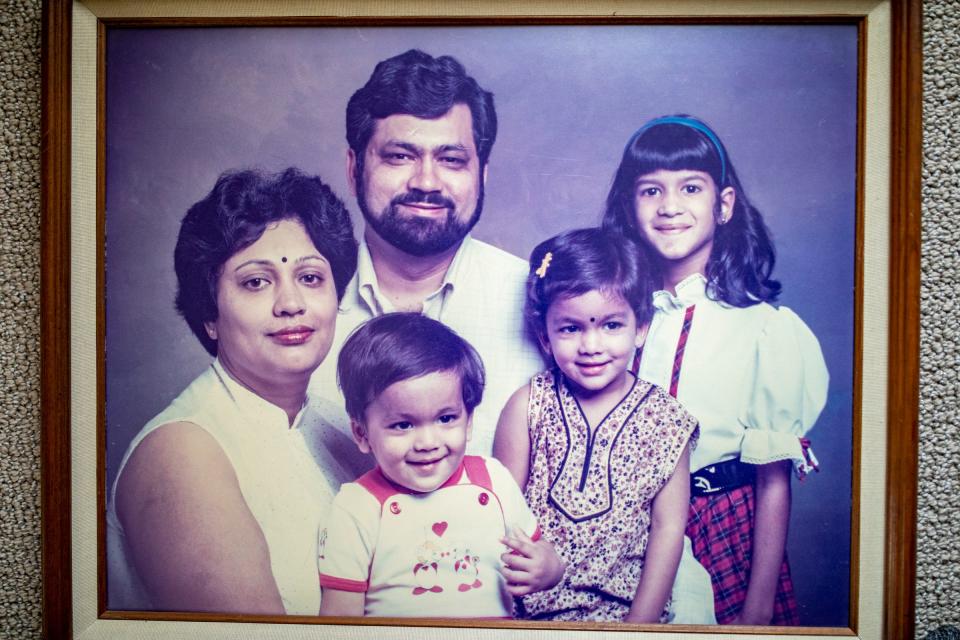
"I ended up picking eggs from a Latina woman. She's Mexican and was 25 at the time her eggs were retrieved."
The sperm donor is an Indian man, she said. "He is 5-foot-11. He’s a scientist, an engineer."
Of the nine embryos that were created, Desai said five were viable, which leaves the door open for the possibility of more children in the future — though the cost might be prohibitive.
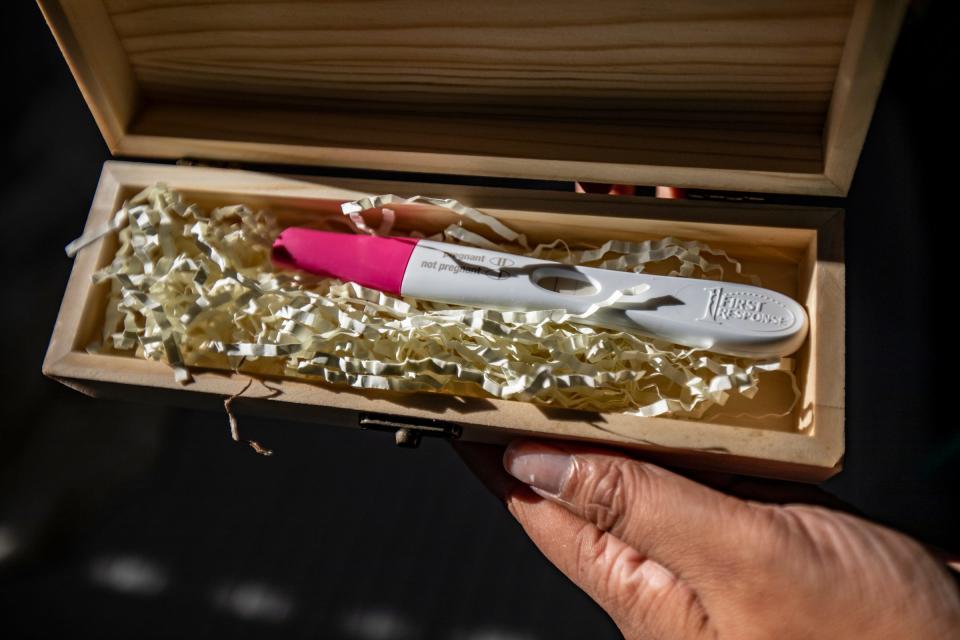
The grand total for this baby: Roughly $200,000.
"That’s all out-of-pocket. Insurance doesn’t cover it," Desai said. "So it is not for the faint of heart."
Michigan's ban on surrogacy contracts
State Rep. Samantha Steckloff, D-Farmington Hills, knows all too well the desperation Desai feels.
"I'm in the exact same situation," said Steckloff, who was diagnosed with triple-positive breast cancer in 2015, when she was in her early 30s and not yet married.
"It is very, very difficult — I wouldn't say impossible, but it is nearly impossible — to adopt with a cancer status as a young adult. You typically have to wait 10 years once you're out of treatment, and unfortunately, preventative care is considered 'treatment.' So a lot of breast cancer survivors are on a type of preventative care called tamoxifen. It cuts out the estrogen in your body, and that is considered still treatment.

"So for someone like me, I had to be on this drug for 10 years. I'd be off at 42 and 10 years later, I am not eligible to adopt anymore because you can't adopt past 50. ... For people like me, our only option is surrogacy, and surrogacy contracts are criminal in this state."
In 1988, then-Gov. James Blanchard signed legislation enacting a statewide ban on commercial surrogacy. Declaring that he was "against the buying and selling of human life," the law Blanchard signed imposed penalties of up to 90 days in jail and a $10,000 fine for individuals. Brokers could face up to five years in jail and a $50,000 fine.
The law remains in place today. Efforts to repeal it have — until now — failed in the Legislature. In the last session, a nine-bill package co-sponsored by Steckloff and other Democrats passed on party lines.
The Senate now will consider whether to repeal the commercial surrogacy ban and create laws around parentage for children born using assisted reproductive technologies.
"This legislation is extremely important. Many women go through some sort of infertility journey, whether it's caused by your medical status or other reasons.
"There's no legal path for families who use reproductive assistance to have their parentage automatically when the child is born. So this affects anyone who uses a donor egg or donor sperm. ... The majority is heterosexual couples, but it's a unique opportunity for many in the LGBTQ community."
With altruistic surrogacy that's now legally used in Michigan, Steckloff said women who harvest their eggs and use a surrogate to carry them must adopt their children after delivery.
"We're seeing it take up to two years for people to adopt their children," she said. "Children are being born, and they are going to be born, no matter what, through assisted reproduction. So we really need to work on that parentage aspect, because what happens if a child is born and go has to go into the NICU (neonatal intensive care unit)? Whose health insurance are they under? Who is making medical decisions?
"Right now in the state of Michigan, those decisions are being made by the surrogate, and that's a huge, huge issue. And again, since we don't have these laws, judges don't know what to do. Some judges do a pre-birth order but they're often not recognized by the hospitals. The birth certificates show the surrogate as the parents.
"This has been going on for decades and this is going to continue as medical advancements increase."
Opposition to changes in Michigan fertility law
The legislation Steckloff co-sponsored considers not only parentage and surrogacy, but inheritance for children born through assisted reproduction.
It faces fierce opposition from many Republicans, along with Right to Life of Michigan and the Michigan Catholic Conference, which morally object to the use of in vitro fertilization and other assisted reproductive technologies.
Democrats, however, hold a 20-18 majority in the state Senate.
"Because we now have the majority," Steckloff said, "it is an opportunity to do it right. ... We have to get every single Democratic vote for it. We're expecting it to move through the Senate, hopefully quickly, but definitely next year."
This bill package doesn't establish compensation laws around surrogacy, but she said it does allow it. And it could help people in myriad situations.
"There's a lot of women who have a BRCA mutation, and don't want to pass it on to their child, so they may carry the child but use a donor egg. That is very common," Steckloff said. "You'd be surprised how many people and how many families go through surrogacy ... all for different reasons.
"And men, too. There's a lot of men who have to go through the system and they use donor sperm."
Steckloff, 39, said she is eager to start a family of her own.
"I had a great oncologist who advised me to harvest my eggs before chemo. I was able to postpone chemo by a month and I had one shot at egg harvesting," Steckloff said.
"I am 8½ years out and I just — after being on oral chemo for eight years — just got the OK from my doctor to carry my own child," she said. "So this is all new for me. ... I still have to go through assisted reproductive care."
She has nine viable eggs cryogenically preserved.
"We have a lot of issues in this state ... because we have no assisted reproduction rights at all. And no child, no matter how you're brought into this world, should have to be adopted by their own parents."
Meeting her baby
Desai said her path to parenthood is far from traditional.
"I realized I need to tell my story and people can take from it what they want," she said. "Indian culture is ... secretive and I’m not doing that. My mom's been on this journey with me and she's open with her friends. Her friends are like, what? Explain this.
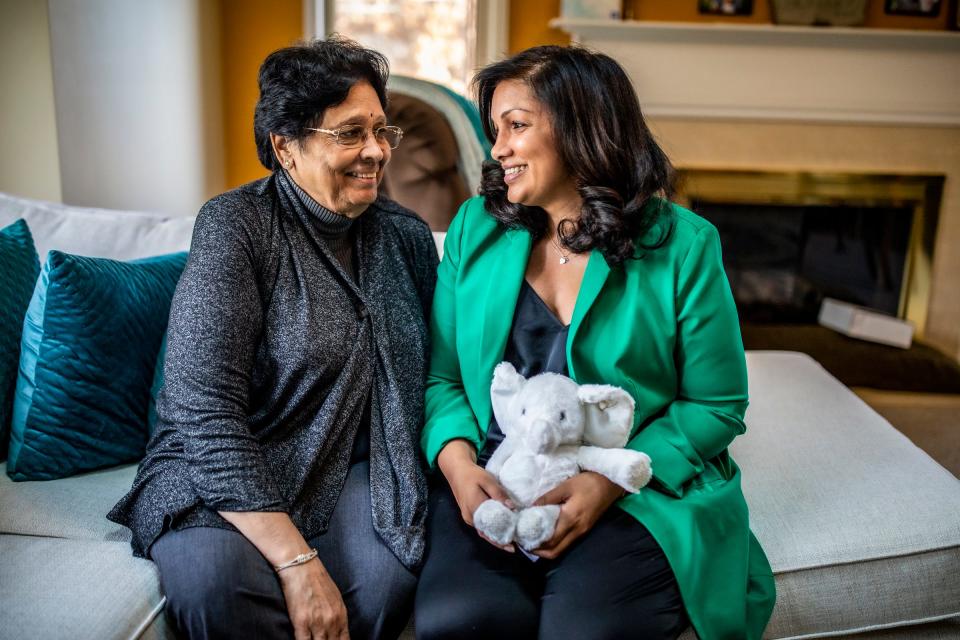
"The uncles are the most confused. They're like, talk me through this again. How is this working? Who's carrying your baby? And every time, I say, 'I'm pregnant. I am having a kid.' Everyone looks at me, at my stomach. ... So it has broken some of the uncles' brains a little bit, but they're all supportive."
She'll be leaving for Texas in late January to await the baby's arrival, and plans to stay about a month after delivery to ensure all is well before returning home to Michigan.
Someday, she'll tell her child the whole story.
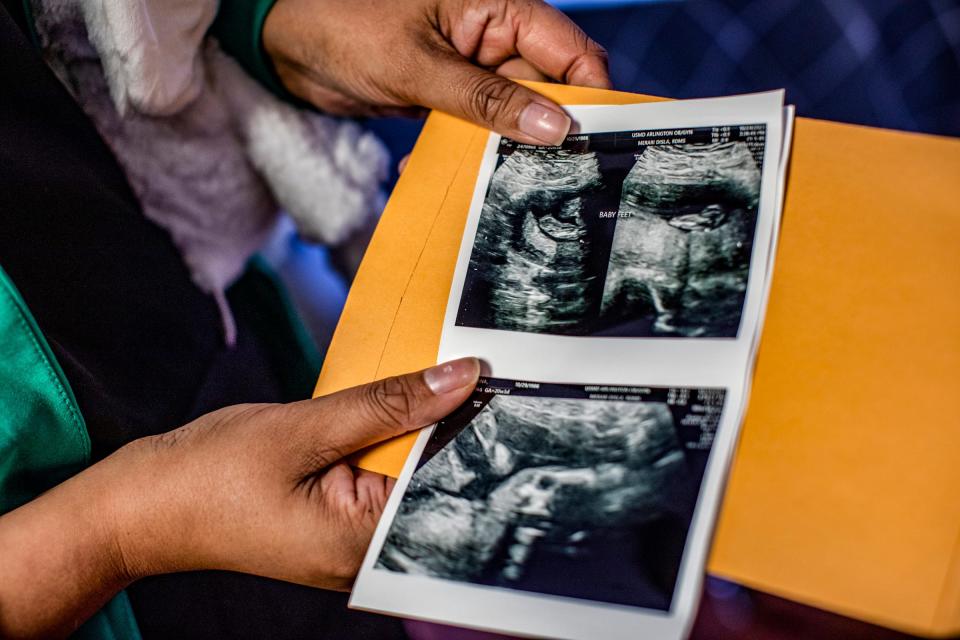
"I’m still very nervous about the future with this child because I am bringing this kid into a very different element than what they might be surrounded by," Desai said.
"I've been looking into mom groups, and I follow this thing on Instagram that’s kind of ... talking about various paths to parenthood. It takes into consideration adoption, fostering, surrogacy, donor conception, etc. So it really is out there. I think we just all need to talk about it more.
"I think we need to normalize all families. The more it’s open and out there, it’s no longer something that's different. People are raised amongst lots of families that don't look like your family. But it doesn't mean your family is the norm and theirs is different. Everybody's is normal."
Contact Kristen Shamus: kshamus@freepress.com. Subscribe to the Free Press.
This article originally appeared on Detroit Free Press: Troy woman won't let breast cancer stop her from being a mother

